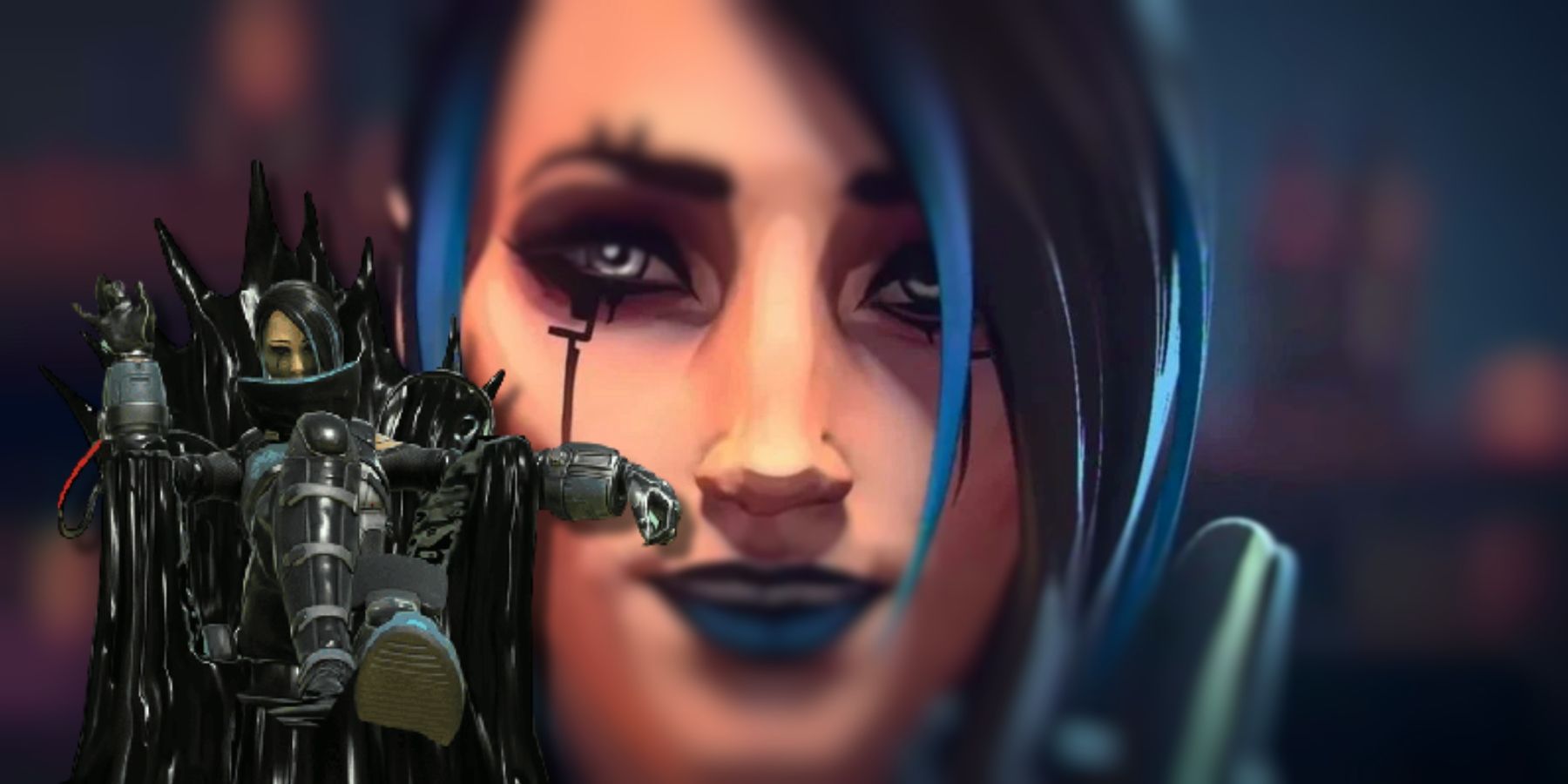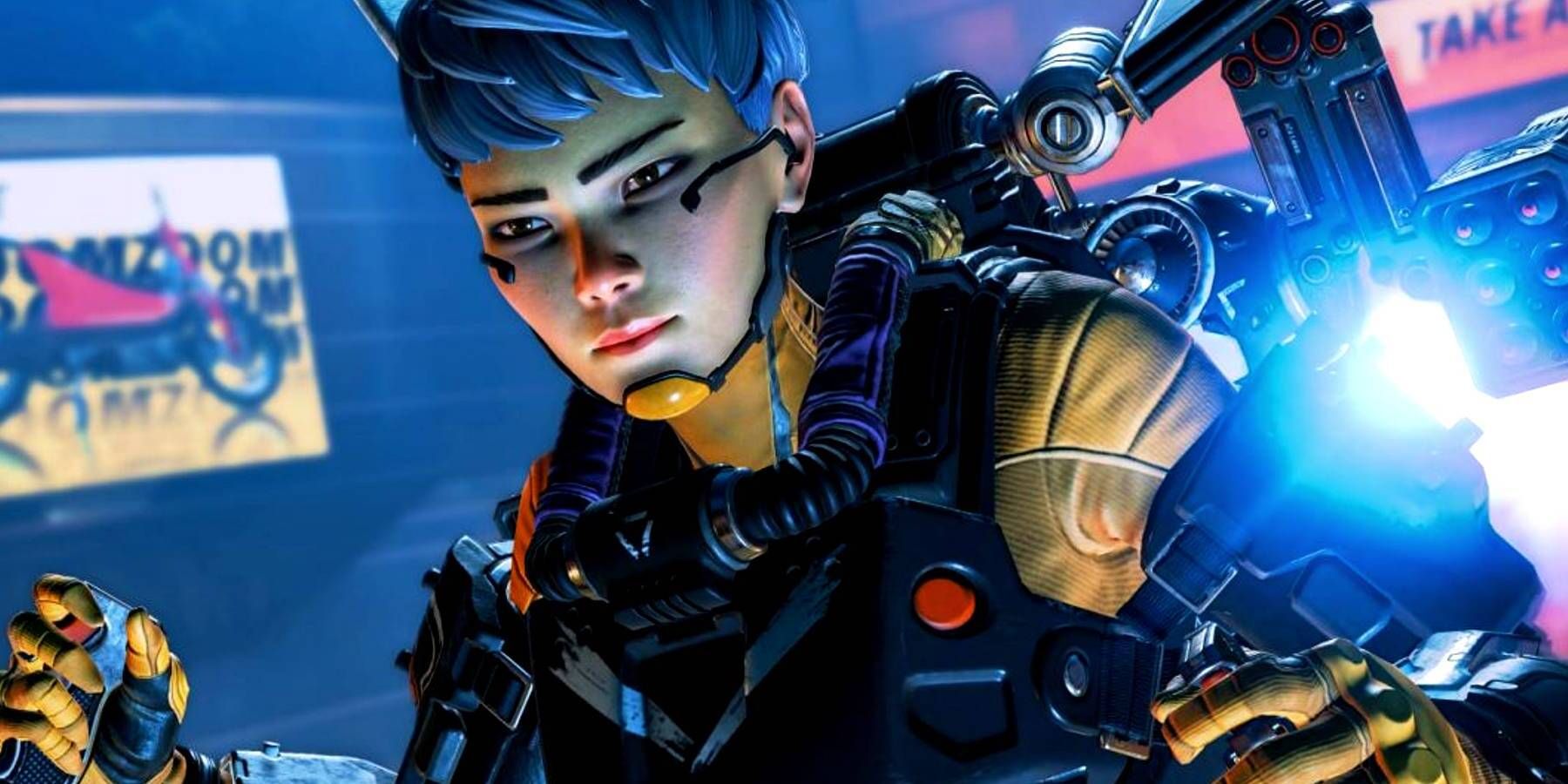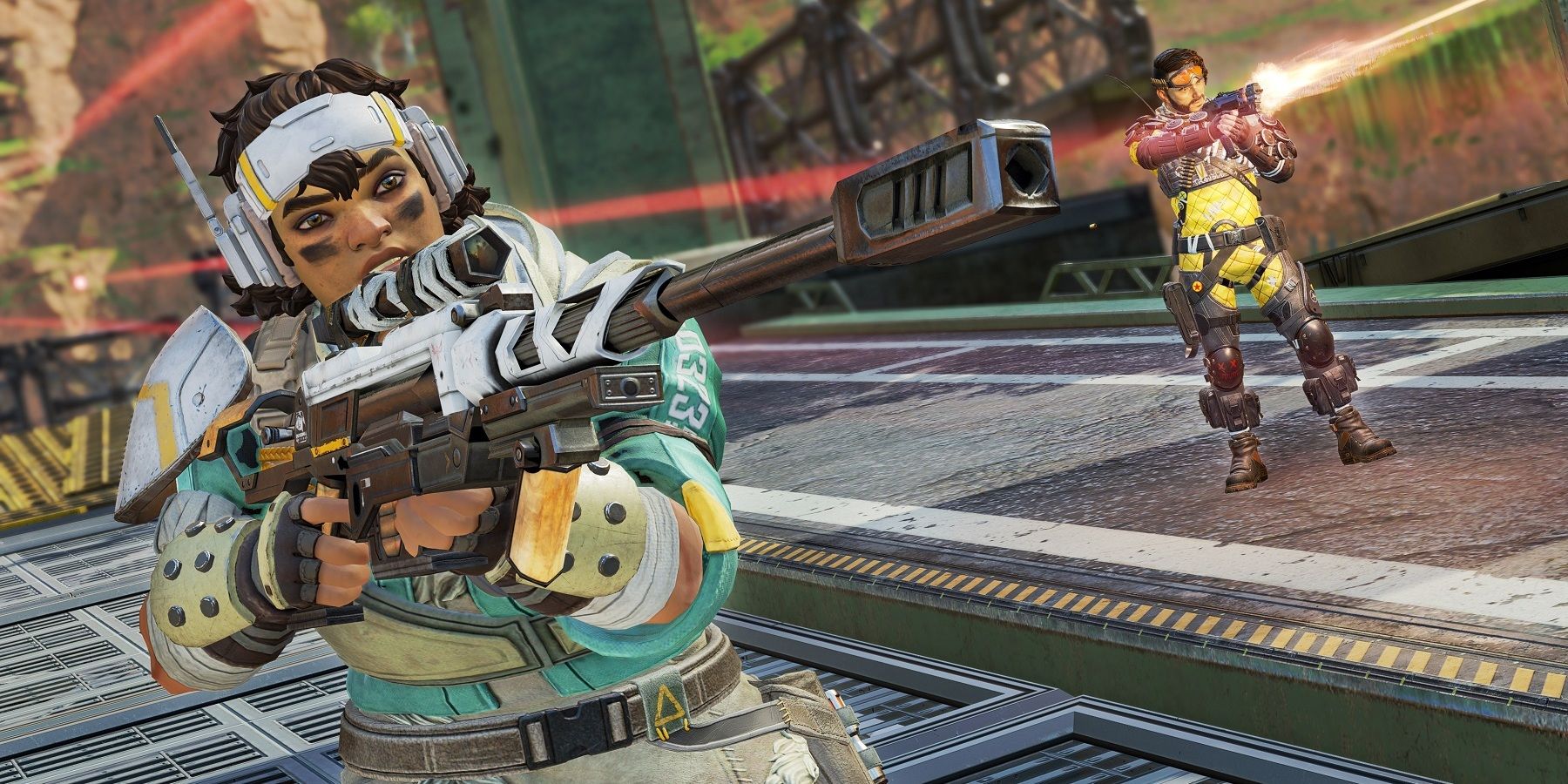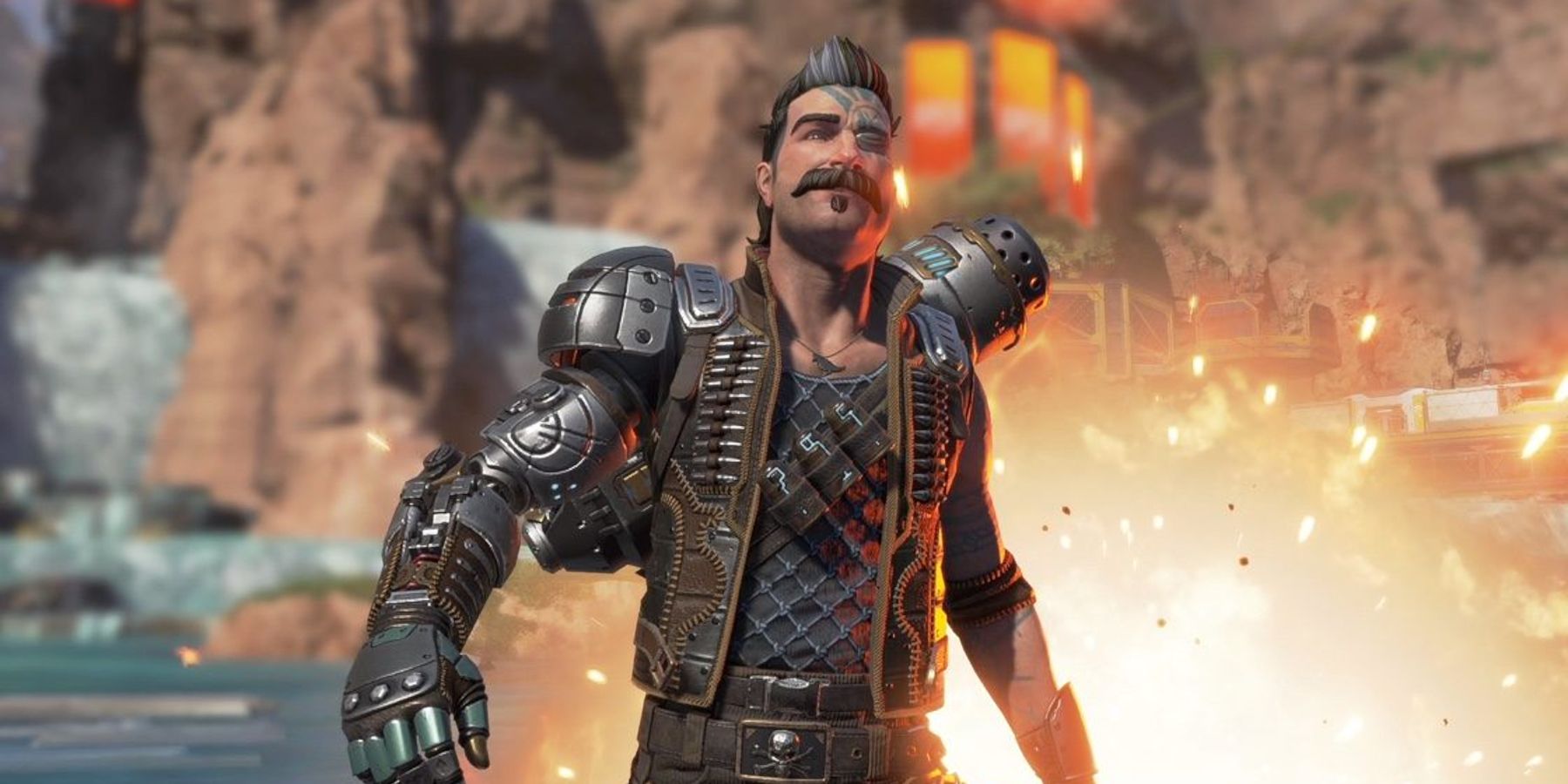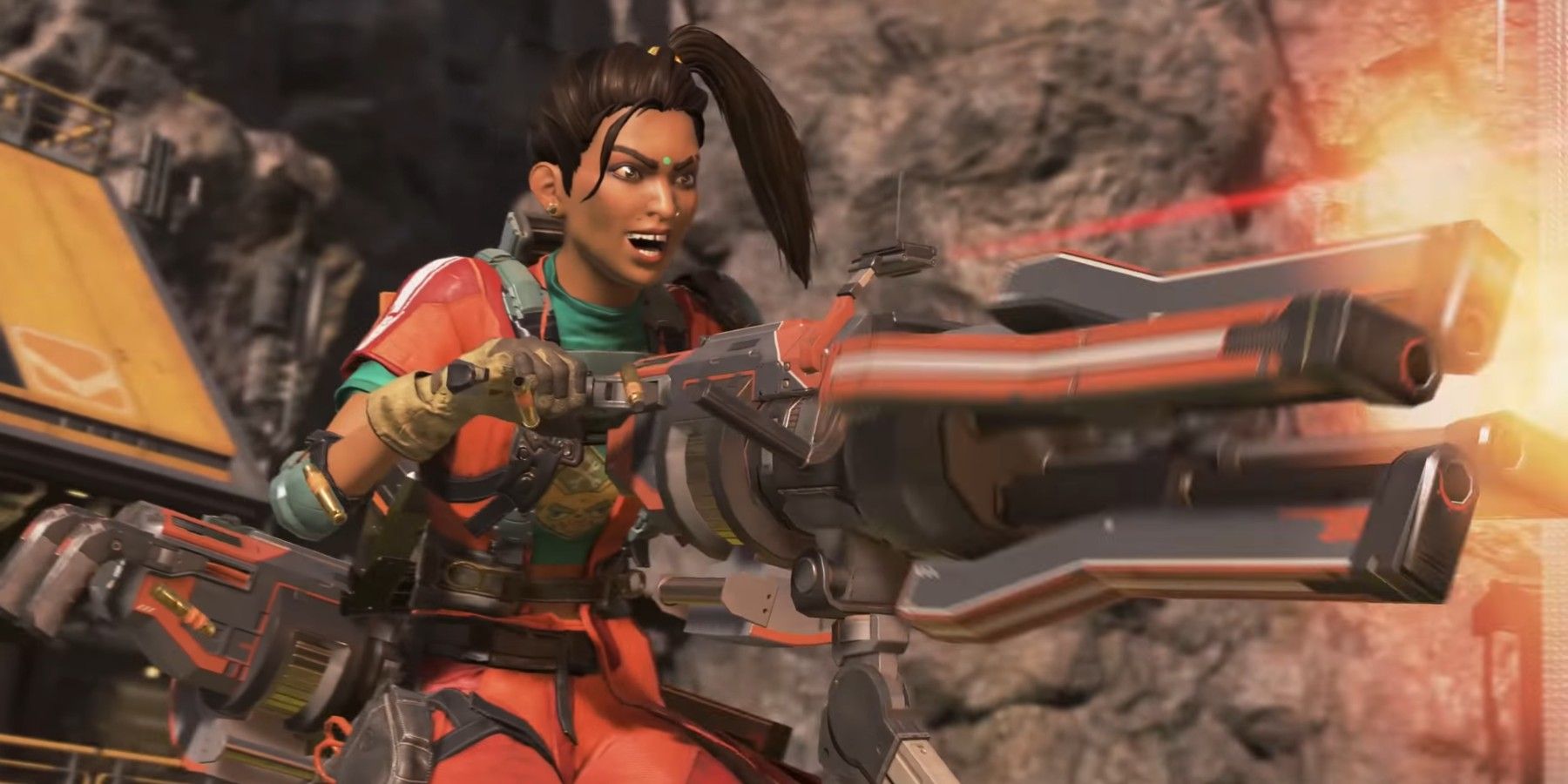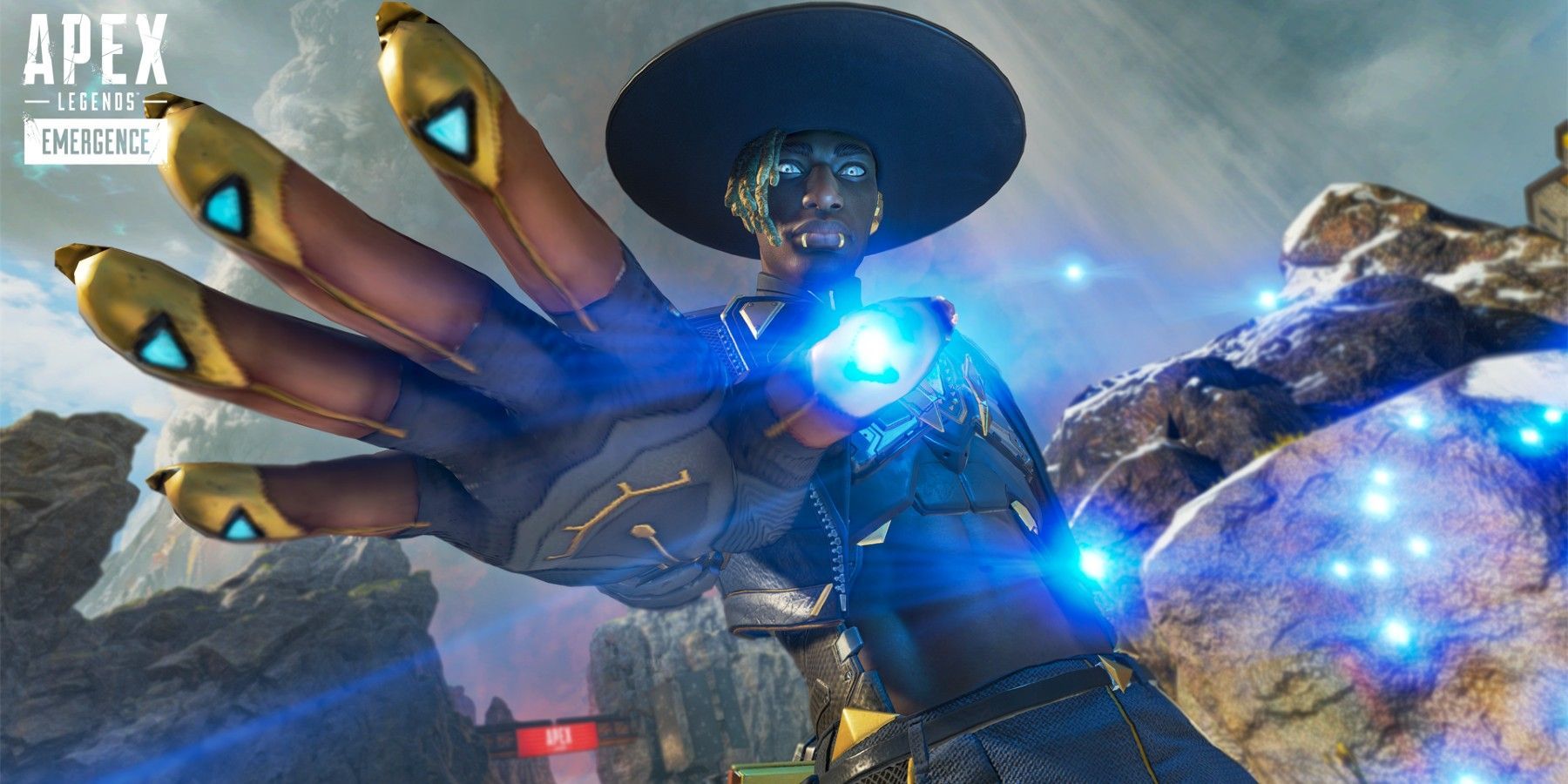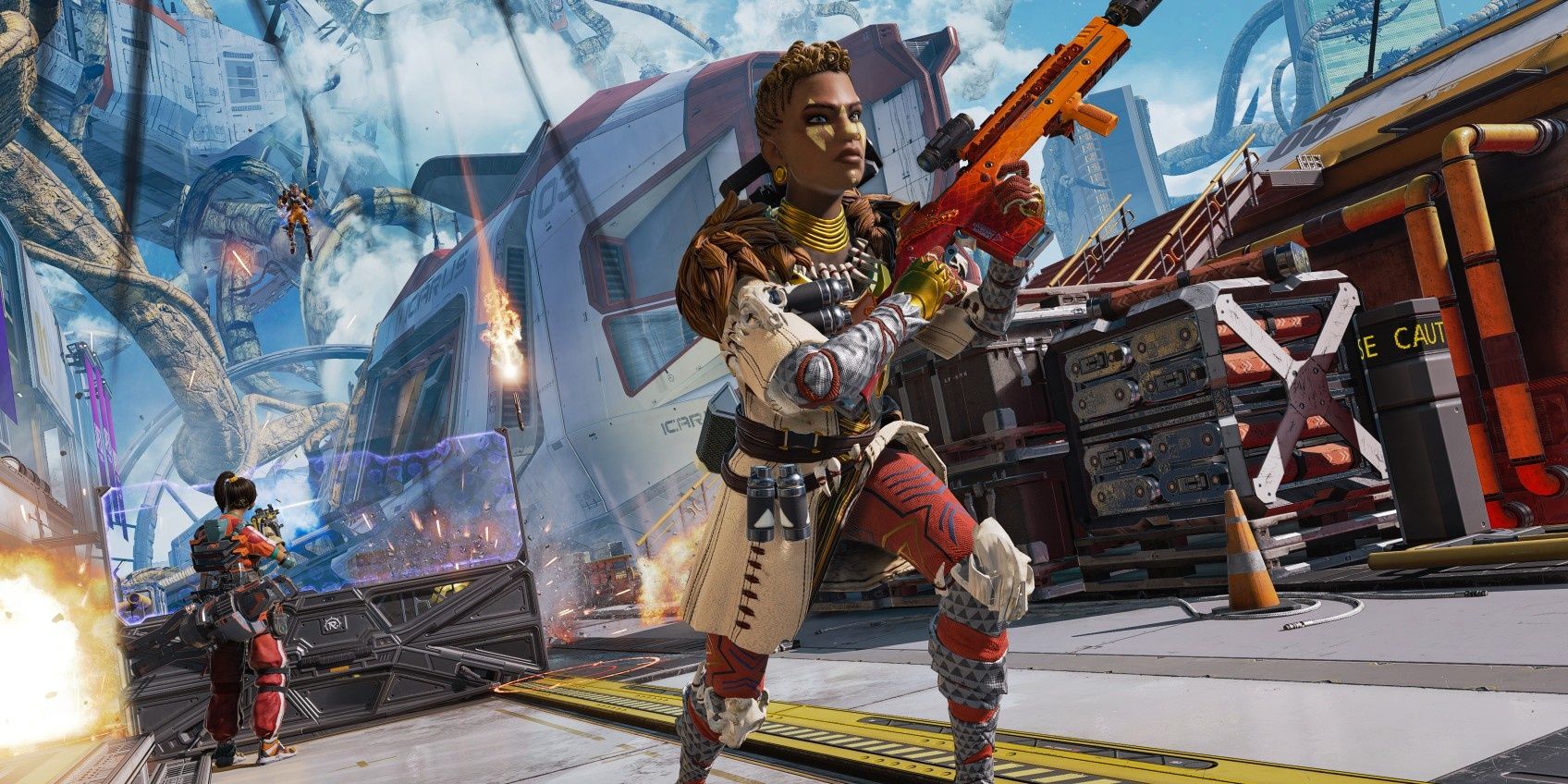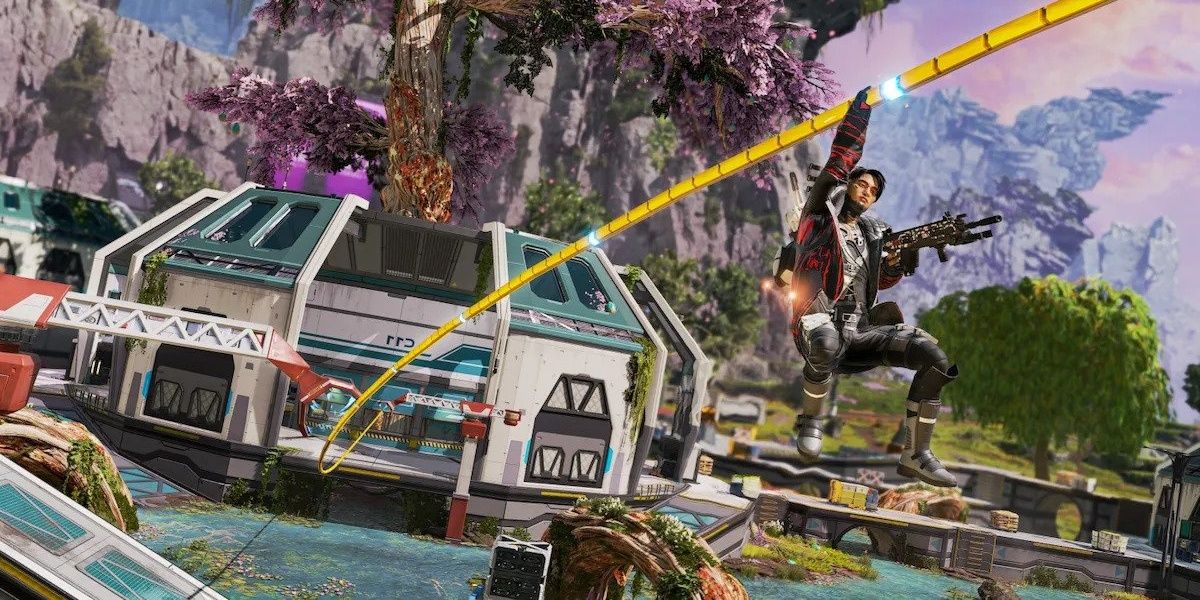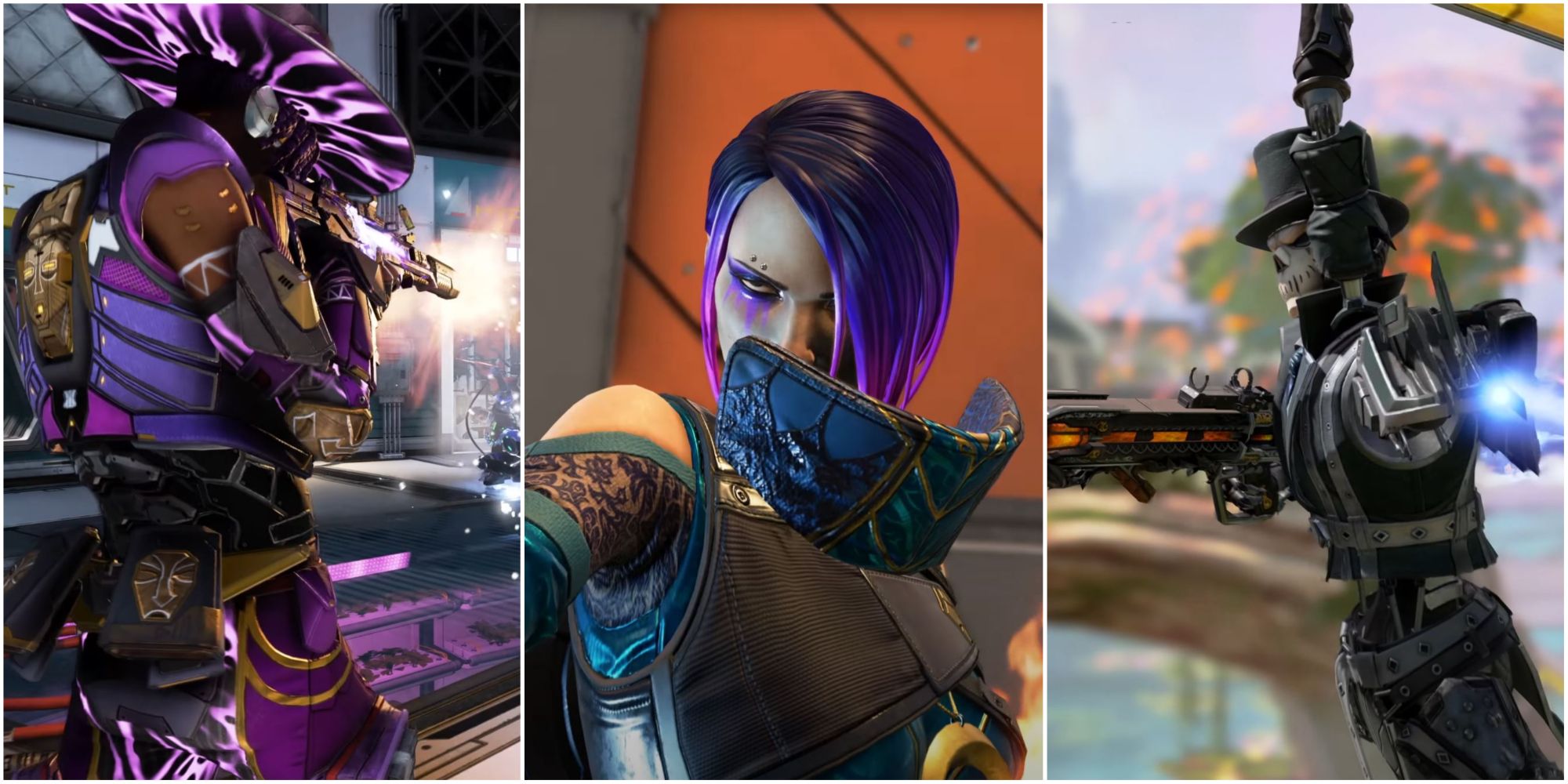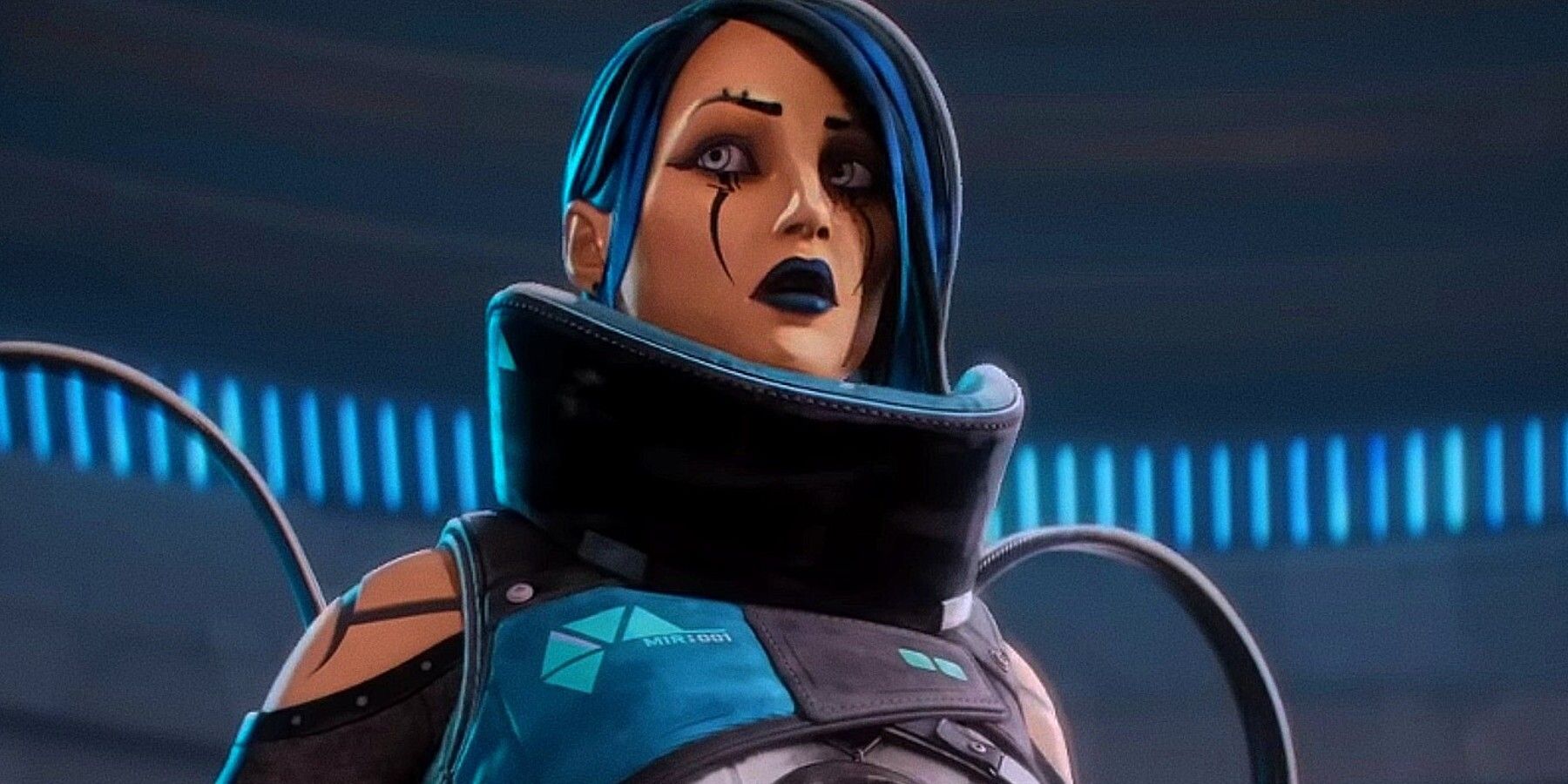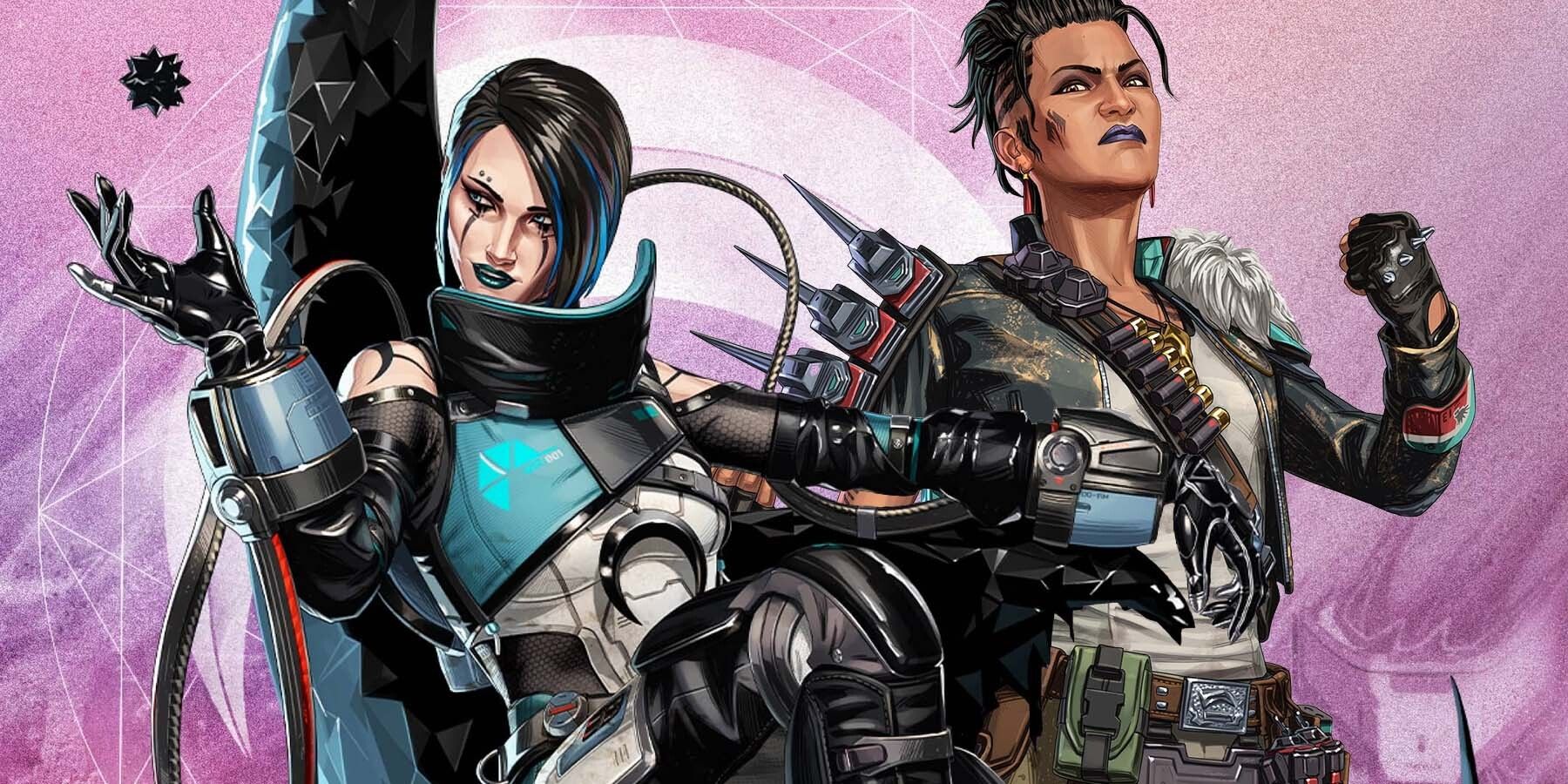Apex Legends' ever-expanding universe got a little bigger thanks to the addition of a new map and an all-new Legend: Catalyst. This is the first trans character to join the cast of Apex Legends, and she also brings interesting new skills to the table. Catalyst's defensive abilities are a fantastic tool for many other Legends to shine, and they have already changed the game's meta.
Catalyst is voiced by trans voice actor Meli Grant, who worked with Respawn Entertainment to bring a very valuable source of LGBTQIA+ representation to Apex Legends, which is already bustling with queer characters and talent. Much like Grant in real life, Catalyst's transition was not something she did right off the bat, and it's something she still actively tries to explore. Grant talked to Game ZXC about what it means that Catalyst joined the games in the Outlands, and how her presence in the game can spark the right conversations about trans voice actors and their work. Interview has been edited for clarity and brevity.
Q: Was it hard for you to be a voice actress when trans people commonly experience dysphoria based on their voice?
A: I'll start in the present and go backward from there. I'm very conscious of the fact that there are not very many trans actors that are working professionally at the highest level, especially in voiceover. I can name five, of which I'm one of them. There are some fantastic voice actors that are working in anime and video games. My housemate, Kayleigh McKee, works a lot in anime and anime-adjacent video games, as well as some American cartoons. Ciaran Strange is a trans man who lives down in Dallas and works on a number of animated shows, primarily anime with Crunchyroll. There are some fantastic actors that are working in visible places in the industry, but there aren't many.
I'm conscious of the fact that there are a lot of eyes on us, and there are a lot of up-and-coming actors who are looking at us as an example. My housemate Kayleigh and I are both pretty comfortable dropping in the masculine range for male characters when we're called to do it, but as trans women that can be incredibly dysphoria-inducing, and I'm so conscious of the fact that it could send the impression to an aspiring actor that they need to get over that and learn how to play in their assigned range as well in order to be successful, and I don't think that's true.
When I have engagements with other actors, or I'm working with Queer Vox, which is a queer voiceover community started by J. P. Karliak, I try as often as possible to remind people that they should always work with whatever is comfortable for them and that you can find a range where you feel safe playing in, and then find success doing that. Nobody needs to play both male and female archetypical characters. Look at all the cis actors, who for decades have been working with no problem. You don't have to just because we do.
I feel like it's important to say that because there's only a small number of role models working in the industry, and it can send the message that you have to be able to get over that dysphoria if you're going to be able to work, and it's not true at all. We have to keep on being competitive actors and working on our craft, level up, hone our abilities, and always keep learning and training. There are actors who work in Hollywood all the time, and they sound like themselves, brilliant performers. Role models are out there.
I transitioned in my late 20s, and I had gone to school for stage and screen acting. I've been on stages my whole life, and I had a moment in my life when I contended with what I felt was the possibility that if I transitioned, I would never be able to work in voice arts. There weren't a lot of examples of prominent trans actors for me.
I was working in retail at the time, and I studied stage and screen acting at university, and then took about 10 years off for a myriad of reasons. It was pre-transition, so it was a period of inner turmoil and pre-discovery that probably made it easier not to bother to be an actor just yet. There was also the fear in general that comes with the idea of living a life in the arts. When I transitioned, I thought that was me throwing away any chance I had of being an actor. I'm so happy I was wrong about that, but that was a very real fear for a long time.
When I finally started working I found the courage to jump in. I had taken voiceover classes pre-transition, I had figured out what kind of roles I was good at, and I'm still good at them for the most part, but I played a lot of young teenage guys because I had a high voice naturally, but I had to figure out where I fit in female archetypes too. Especially in the anime world, where everything tends to fall into these rigid, very defined frameworks.
I had a moment, and that moment was multiple years of figuring out how to play female characters, and what kind of female characters my voice fits, or I want to play. Are there roles that I want to play that I'm not good at that I have to learn? That was a process, and it's still an ongoing process. At some point, I would love to go back on stage again or to get in front of the camera and maybe do some film or television, but I feel it's going to be the same journey again of figuring out what kind of roles do I play because it's a world I've never been in before.
My entire background as an actor was all in male roles, so that was a huge hurdle that I needed to get over. Catalyst is a perfect example of finding an archetype that I was not good at and working on to death until I was. When I first started playing female roles, I strongly gravitated towards strong, commanding, powerful, muscular women, and I remember being in a class one day, and because of my voice being a lower voice, the coach gave me kind of a femme fatale sort of sultry, sexy character. I just crashed and burned. I was horrible.
The teacher was so confused. He gave me this monologue at the end of class, basically saying "I don't understand why this is something you're not good at. This is something you need to work on because with the lower voice you can play these sultry, serious, smoky characters, but you have to work on it because it's clearly something you haven't spent a lot of time developing. Thank goodness I took his advice because over the next few years it's been a muscle I've continued to develop, and Catalyst very much falls into that femme fatale, kind of smoky, sultry area. I like to joke she's Batwoman with a little extra sultry.
I was thinking about this the other day. When we create characters for the game, we don't try to create voices as they relate to the other actors. Oftentimes, we'll play something that is very close to home, but in the aftermath, I've looked back, and I realized that Catalyst kinda has the seriousness of Wraith, a bit of the sultry of Loba, but also has that grim, deadly focus of Ash. So if you took Wraith, Ash, and Loba and put them in a triangle, I feel like Catalyst would be somewhere in between the three of them.
Q: Do you feel like there's a connection between Catalyst's abilities and her being trans?
A: There's a lot of this character that resonates with me. It's not just the mechanics either, it's her sense of humor that connects with me on so many levels. She has this sort of rye sense of humor, she's very serious, but she'll make these sort of sardonic jokes that were so familiar to me because I know that that's something that myself and other trans women that I'm friends with developed. We developed this sort of darker sense of humor. When you live in this world where it's so easy to find people who are against you just by logging on the internet or turning on the television.
You don't have many choices in how you deal with it, and one of those choices is to laugh through it and build up your coping mechanisms and your defenses in order to deal with that inherently hostile world. While the Outlands are not a bigoted place, I do think that there is something that resonated with me in this world about the way Catalyst approaches humor and her relationships with other people. Also, seeing the development, see her go from this teenager who is bright-eyed and bushy-tailed, and a little quiet, shy, and deferred to her friend, to this intense Batwoman-y personality by the time she enters the games, you can see this is someone who has over the course of her life had to kinda build up her defenses and develop a thick skin to deal with the world.
It's such a different person that enters the games from who we saw in that initial trailer, and she's a colder person. It'll be interesting to see where she goes from there, starting to make friends, open up, and maybe find some of the light that used to be there. That might speak to the fact that she's a defensive character.
There have been multiple jokes in fact over the course of recording her, and some of them were lines that may have not made it into the game, but we've had jokes along the way about how she has her walls up. She seals doors and puts up walls, kinda locks the world away. It does feel like Catalyst's abilities could be the outward expression of her coping mechanisms, so I feel that aspect of it.
We're strongest when we work together. Oftentimes, I've been able to get through my darkest moments by talking to my other trans and non-binary friends, and talking through how I feel. We support each other, we defend each other. Even when announcing this role I've had a number of the Legends, the other actors, reach out and ask if they need to run interference for me because it's always easier, I think, to see issues that resonate with you from outside of yourself and work your way through them intellectually.
As people, it's hard to work through those issues. It's easier to short-circuit when it's happening to you personally, so when you can see it from the outside and be a supportive friend, and take care of the people you love, it's always easier from that bird's-eye-view to dissect and navigate those issues. This is probably one of the reasons that therapy is so useful.
Therapy was so immensely helpful to me when I was first coming out because it gave me that safe space where in that moment there was no immediacy, there was no urgency that could short-circuit me, and I could just have a safe space to talk out loud about how I felt, sort of step back and put together my thoughts. Hit that from a bunch of different angles. There was a line at some point, I don't know if we'll see it, but I think it was from a time before her abilities. It was her saying something like "Putting up a barrier!", and then she gets an aside where she goes "Huh, I guess I got my walls up." I remember that really struck a chord with me.
I think the way you approach transitioning strongly depends on whether you have a good support system. If you're out there alone and all you're seeing is on television or conservative podcasts or the Twitter space, you can feel very alone and feel like the world is against you. While I think that a social circle and a community doesn't necessarily replace the benefits of therapy, which I think is incredibly important, having that support system to remind you that you're not alone and that you are enough, and that often times those negative voices you hear are just very, very loud minorities, I think can really help stabilize you.
It certainly helped me navigate this because there's been such an incredible outpouring of love, so much more than every little negative comment. I've seen some awful comments. On Twitter, one or two were sent to me privately, but in the context of all that love I'm able to see they were just people screaming at clouds, and I can ignore them because they don't matter. Once or twice I might have engaged if I felt I had a specific way that I think I can engage that person and that would be a benefit for everyone watching, to the rest of the community, I might choose to jump in. Most of the time I'll just hide the message and move on because I don't need that negativity in my life. It's so clear when you see the bigger picture how small a group that is that for whatever reason can't let go of that hostility and that hate.
Handling trolls and haters is always a calculation because you risk kicking the hornet's nest, and if you pick the wrong fight you might just provoke a harassment campaign. More often than not I think it's easier to just hide, mute, and block. If I do try to engage I do that either as a quote retweet, I'll take a screenshot, block out the name, and obviously, people can go search the words, but often these people are not worth the clicks. Maybe I'll post the message and engage with that.
I think it was Zelda Williams, Robin Williams' daughter, who works in the industry as a director, an actor, and a writer, she had tweeted something recently about how she sees the Twitter space like it's your stage, like you're doing stand-up. If there's a conversation to be had she quote-retweets it from there so that the rest of her audience can be a part of that conversation. I think it can be hit or miss, but I like the idea of that. You have to counterbalance that negative presence, and it doesn't need more attention, so more often than not I started with a screenshot so that there's no tweet to link to.
My goal is never to take my own audience and fire back with it, but you can use it as a teaching moment, as a thoughtful way that can kinda put a positive stand to it, engage with that idea. I had one recently where someone said something like "It's disgusting that this character is in the game. Being trans isn't normal," so I wrote back on my own Twitter and said "I don't know, if I look at my life it's pretty normal. I work, I pay my rent, I try to eat well, I try to show love to the people in my life, and gratitude to those who support me. I worry about getting places on time and deciding whether to take the highway or to avoid it and take the slow way to the studios I'm going to work at. That's pretty normal to me."
There's this whole idea that the strawmen that the people on the bigoted side of the aisle would paint us as this sort of hypersensitive, angry people who just want to get you fired from your job when most of us don't have time for that. We're just trying to get to work on time, pay the bills, and maybe have some downtime to play video games or read a comic book or hang out with friends. We've got too much regular crap to deal with to even remotely resemble that strawman that those on the right would have you believe is the entire trans experience, and it's so far from the truth.
That target is constantly shifting. Often times it's especially marginalized groups that are used as a talking point to help win elections, so there are people who will drop as much fear as humanly possible on a narrow, ill-informed topic where they are just feeding misinformation and trying to provoke fear and outrage. We don't have time for that. We're just people, and we've been here forever. We're in the spotlight now for two reasons: it's politically convenient for some people, and we put ourselves in the spotlight because we're trying to get some positive representation into our media.
We want to create television shows and media that are more reflective of the actual world that we live in because it's about damn time. Catalyst is not the first, but she's an incredibly important step in that direction. A terrifying step for me in that direction because I'm at the center of it, but a very important step toward normalizing trans stories and marginalized stories in general. Queer stories, non-binary stories, POC stories, as just a regular part of the entertainment we consume. That's the world that we live in, why shouldn't our media reflect our actual lives?
One thing that was important for Catalyst was that we didn't need to tell a transition story or story that was about bigotry because there are a lot of stories like that. I think telling those stories is also important, but just as important is telling stories that have three-dimensional, nuanced characters that have more going for them than just their identity, which isn't to say that games like The Last of Us didn't do that. The idea is that we can have a trans character that doesn't involve telling a transition story. I think it's cool that we have multiple examples in our media.
With Catalyst, in particular, it's after she transitioned, and she's still figuring out the growing pains of how to move through the world and what femininity means to her, how she presents that. She has her own issues at home, disagreements with her family and friend group, she has hobbies, she cares about the environment, and she's worried about her planet, and she's doing what she can to fight against a corporation that doesn't care about the people living there and only about the profit from digging what's underneath the soil. There is so much more going on for her than her trans aspect.
She also happens to be trans, and that is a very positive and necessary story to be into and to create more trans visibility - to have stories that don't entirely center their transness without hiding it, and Catalyst is very proud of being trans, and she doesn't shy away from it. She talks about it, she says it, and it is important to her, but it's not the only thing that defines her. That's why she's resonating with people. She certainly resonated with me for having those multiple layers to her.
It's that tightrope we're walking, to make sure that her transness is front and center so that there's no room for doubt, and we're very forthcoming about who she is, but also want to be a nuanced character that's multi-layered and has hobbies, things she cares about and has a lot more going on than just that. That's just one facet. That speaks to me as an actor because I often kind of intentionally put that off as a footnote to make the same emphasis. If I write a bio for a convention or something, I often say I'm a voice actor living in Los Angeles, I've been a part of these games and these shows, I also write, I've written for this show and this show, and I'm trans.
Q: What do you think of the game's approach to Catalyst's transition?
A: I think narratively the intention was, at least as far as the major bits of her transition are concerned, that was done by the time that we meet Catalyst in the first trailer, but that certainly speaks to the fact that there's still a tremendous amount of self-discovery, self-actualization, and figuring out who she is and what she cares about, and continue to find her place in the world. In the trailer she has very much supplemented her needs with those of Margo, she very much defers to Margo and looks up to her.
At some point along the line, she is now entering the games, and it's her first opportunity, or maybe a good opportunity to finally introduce herself on her own terms, create relationships on her own terms, and kind of define herself again for the first time. We had a talk about that when we were recording because we were trying to decide how we wanted Catalyst to sound in the lore trailer, and I ended up pitching up a little bit.
She has a lower voice in the game, and she has kind of a softer voice in the trailer, which can be confused with common tropes, especially in anime and cartoons in general where a younger character sounds higher, and that might not make a lot of sense at first glance, at least for a trans-feminine character who's already had her voice change. However, it definitely spoke to me from the perspective of figuring out what femininity means to me.
I can't speak for anybody else, but I had a moment in my life where I was still navigating who I wanted to be, and I went through a phase where I tried to pitch a lot higher and have a softer, archetypically feminine voice when I talked to people, and then eventually I found something that felt more like me. So, to me, it makes a whole lot of sense that maybe she would be trying to raise her voice a little higher because that's what femininity meant to her at the time.
As we meet her as an adult, she has sort of settled into herself, and she has discovered who she really wants to be and how she really wants to present herself to the world. That's really powerful to me. A given voice might be the perfect fit for you, but it also might not be. There's a reason that so many trans stories describe transitioning as if you're going back through puberty for the second time. There is a lot of that emotional turmoil of figuring out who you want to be and what feels natural to you.
So maybe, earlier on, when she's younger, she is trying to affect this higher, more feminine idea of what being a woman means to her, and then she discovers later that that doesn't fit her as well, and now she has found this more confident, deeper, darker persona that feels more natural, and maybe that will continue to shift and change as it goes forward. I've certainly redefined myself a handful of times throughout my life.
I personally had a moment when I was working in downtown Soho in New York, a very fashionable district in New York, and so I felt a lot of that pressure for the first time, starting to feel the pressure of feminine beauty standards. So I, of my own accord, would show up at work wearing more makeup than I ever wear now, wearing heels, a dress, something that would feel more appropriate in my head at the time. Then, at a certain point, I had a reckoning and remembered that was never really who I was.
I was never someone who begged her parents to dress up as a princess on Halloween or collect dolls. I was setting things on fire and running around the backyard with a slingshot, playing video games. That's always been who I am and what's been comfortable for me, and now I'm back there. I had that moment of trying to sort of conform to this idea that turned out not to truly be what I felt in my heart. I've since found the confidence to shed that and go back to something that feels more authentic to me.
We talked about Catalyst's voice too because if she transitioned at the age of 15 or so, and we have an actor, me, who's been through a testosterone puberty, how do we square that? The Outlands are not a magical place. She has been through a transition that is hopefully a lot more accessible and a lot easier than what we have today, but it's not magic. There is also no gatekeeping, there is no bigotry. It's accessible.
So the question became: then why did she wait until her voice started to change to transition? Who would do that if it's that easy? And this is kind of a technical problem, as they're writing around the actor they cast, and not wanting to cast another actor or kind of trying to come up with another idea. Where we landed, and it was a group decision - I was not part of the writing team, but stuff specific to that backstory we had a lot of conversations together as a group, collaboratively, about what would be the impetus for something like that.
We wanted it to resonate with and feel authentic to Catalyst, to me, to the audience, and where we landed was that because Catalyst maybe is not afraid that her parents won't accept her, maybe that doesn't exist in the Outlands, but that doesn't mean that as a teenager we don't experience fear and anxiety, that we might not worry that by creating such a major change it could have an impact on the people around us.
There might be concerns about forcing your parents to have to adjust to new pronouns and a new relationship with you. What happens when family friends ask "How's your son doing?", and they need to have that conversation? All that can put a lot of anxiety on the shoulders of a teenager, and it kinda felt right that maybe, even though it was all accessible, for everyone else's sake Catalyst may have dragged her feet a little bit.
She wanted everyone else around her to be comfortable and happy, and that definitely speaks to her relationship with Margo, who she largely defers to in the flashback until Margo disappears. Then, you have to imagine that at a certain point in her childhood she becomes a teenager, her voice starts to change, and suddenly it's like "Panic! Oh, no! I have to do this right now!," so that's kind of where we landed with it. It feels real to me, and I hope it resonates with the people that are playing.
Again, without wanting to create a world where bigotry exists in the Outlands, I think that's not something that exists in the world of Apex Legends, but in my brain speaks to the fact that there are a lot of people out there in the world who are questioning, or haven't felt comfortable coming out because they're in a social situation, or they're in a family where they're not entirely comfortable crossing that line and taking that step yet.
There are a lot of people that need to get to a place in their lives where they are financially independent or have a support system that's strong enough before they make a jump like that. And so, while it might not come from a place of bigotry, there is still that anxiety of not being sure what the future will hold and not being sure about what your family will do, even if hate is not one of the options. I'm repeating myself, but that can definitely weigh on the shoulders of a 15-year-old who might decide to drag her feet a little bit.
It sure has influenced the Catalyst that we see in the game now, having lost Margo, and how she had that major moment impact her life. I can't speak for the writers, but I definitely, when I'm in the booth, interpret that level of seriousness and grim energy that she brings to the game as a sort of "I have to keep my guard up a little bit because I'm not gonna let myself be hurt like that again."
Q: Did you hear about the Bayonetta 3 issues with voice acting and pay? What's your opinion?
A: I have followed that loosely. It's been a very busy few weeks for me. So I don't know all of the details, but I have been following that a little. I don't want to speak from a place of ignorance on that since I don't know any of the players personally, so I don't want to put words in their mouths, but from an outsider's perspective it's such a fascinating situation because there's absolutely a conversation to be had about how much money these franchises bring in, and how little of that finds its way to the talent that help make those properties successful.
It's been a long-time conversation within the union of voice actors about how little we tend to be compensated relative to the success of the work that we put out and how big a disparity there is between that and film and television, especially when you get down in the world of anime, where we may be localizing something rather than being the original actors. There was a time when a number of anime studios were paying voice actors $35 an hour to work on shows that were bringing millions upon millions of dollars.
I would love to see a world where actors that are part of large properties like that are taken at least as good care as everybody else. Obviously, and I don't wanna speak out of line or from a place of ignorance, but we definitely need to start that conversation from a place of transparency and honesty. If we start from a place of not having all the facts straight and jumping in from an emotional place rather than actually looking at the numbers on the table, we're not going to get anything done.
There's so much there. Residuals don't exist anymore. We don't get any tiny little percent of sales, so no matter how good a property does, we don't see any of that. I say this as someone who's very new to this, and I should be very upfront and say that by my standards, as someone who's very new to working at what I would consider the highest level of video games, they've taken very good care of me at Respawn Entertainment.
It feels like the bar is very low when it comes to the things that we need as human beings, especially as trans folks, but I've had crap healthcare for years. Fortunately, I've had enough to get prescriptions, but very little more than that. Working on Apex Legends has been one of the leading contributors to, hopefully, qualifying for better healthcare next year. For the first time in probably something like seven years, I'll be having a really quality health plan and I'll be able to get better care of myself.
It does feel frustrating that the bar is that low, but all there is to say is that I'm incredibly grateful for how well EA and Respawn have taken care of me. But, if you zoom out a little bit, that still is a very small percentage compared to what a lot of these games see. It would be cool to have a conversation about making the compensation for the talent involved better reflect the success of the project one is working on.
I would extend that to everything.
There have been many stories in the anime world where multimillion-dollar franchises pay very little per hour. My housemate, Kayleigh McKee, was the star of the Jujitsu Kaisen 0 movie in the English version that hit theaters last year, I believe, and that movie made something like two hundred million dollars, and she made something like three hundred bucks. That's ridiculous. I don't think we'll get all the answers, but it's definitely worth having that conversation.
All that is to say, within the current framework, Respawn has taken incredibly good care of me, and I'm so grateful for that. As an industry, it would be really cool to go back over the numbers and maybe try to define a new normal that creates more opportunity for the people working in this field because the bar shouldn't definitely be at "Hopefully I get healthcare." I think we can do better as an industry.
Thank goodness, Apex Legends has been such a wonderful job to work on because it hasn't been very demanding vocally. A lot of the exertions are very soft, and very lower volume. Very easy work. It's all character work for the most part. A lot of video games are not that though, and I've done many video game sessions where I've been in the booth for four hours, screaming at the top of my lungs, just dying at full volume for three-and-a-half-to-four hours. It shreds your voice.
What we do to take care of ourselves is we have training as professional actors to be able to limit how much stress we put on our voice despite how intense those sessions are. We limit how long the sessions are, so we don't work past a certain amount because we want to at least limit the damage we do to ourselves. I try to make sure that those sessions happen on a Friday so that I can not talk to anybody for the whole weekend.
There are things that can help with your voice, like hot water, tea, and honey, and there are certain syrups that are very good, but all that doesn't heal you. The only way to heal your voice is by not using it. There are a lot of sessions like that, and that's just another example of why there needs to be an extra level of attention and care to the people working these jobs because they are tough, demanding jobs. Please, let this just be the beginning.
I hope from the bottom of my heart that Catalyst serves as a proof of concept for two things: that trans stories are wanted, and needed, that people are interested in them and that they have a place in the media that we consume, and then from a cynical corporation standpoint that they're profitable and make studios money so that they want more of them. Often times we see that when we do representation right it makes money.
Maybe for me, I want it to be a proof of concept that trans talent can work at the highest levels, be professionally competitive in Hollywood, and they should be taken seriously as performers, that we can put the same work in mastering our craft and can be just as competitive. Hopefully, not just as trans characters. We don't just need to play ourselves, but that we're taken seriously for all roles. There need to be opportunities outside just queer roles. But, as marginalized people, we need to be able to play ourselves too because we often don't have a seat at the table or the same opportunities that other performers do. That's the entry-level, but then we should be given opportunities to play cis roles too, for example.
Q: Speaking of representation in games, what do you think of the representation in Destiny 2?
A: I adore Destiny 2! I want to be in Destiny so badly! Destiny is such a strange animal because the story spans the galaxy, but just because of the nature of the game there are so few characters. Like, every planet has one person on it, so it's definitely a hard format to create more representation, but I would love to see more.
I'm very interested to find out more about the Cloud Striders on Neptune. I'm taking a measured approach to it because I know that we're coming into this whole new civilization, this whole new city, full of vibrant life - supposedly. To me, that's the perfect opportunity to bring in more talent, and I would love to see the world of Destiny have more queer representation.
I've been a Bungie fan since I was a child, back when I was playing Marathon, Minotaur, and Pathways into Darkness. I played on my dad's computer, and I will scream if they bring back Marathon, I adored that game. I will say this though, and it kind of feels contrary considering I'm a voice actor, but I'm partial to the silent protagonist in games. As much as I would love to be in a Marathon property, there's also a part of me that would be happy to have the return of the security chief as a silent protagonist.
I think that Destiny 2 has done a decent job, especially with POC representation and how they highlighted the relationship between Saint-14 and Osiris. It's been phenomenal. I love listening to Saint and Osiris' story when I've seen those characters grow and mature. We're also going to see non-binary characters in Lightfall. So please, more, that's my only hope. And also cast me!
Apex Legends is available now for Mobile, PC, PS4, PS5, Switch, Xbox One, and Xbox Series X/S.

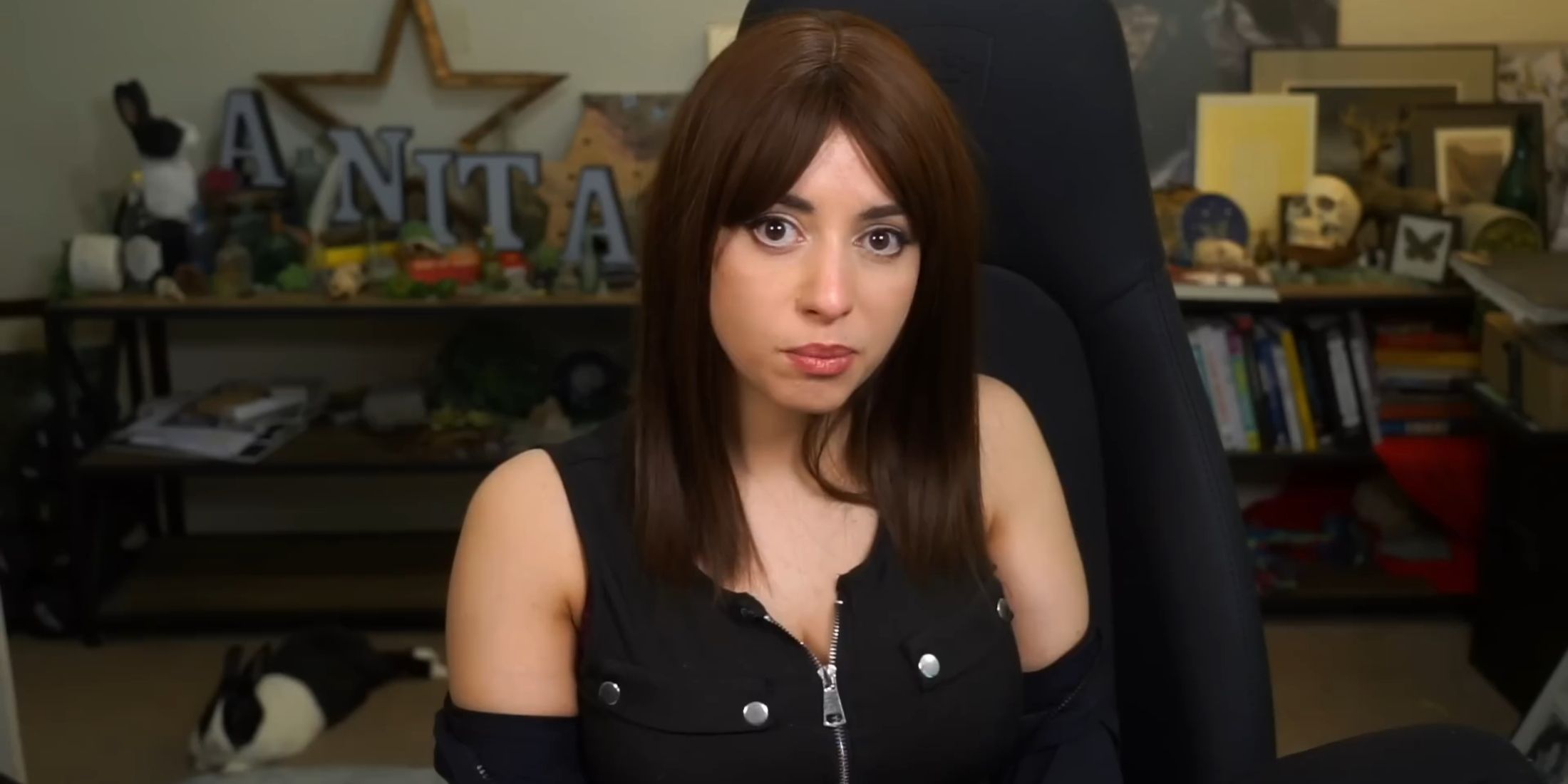
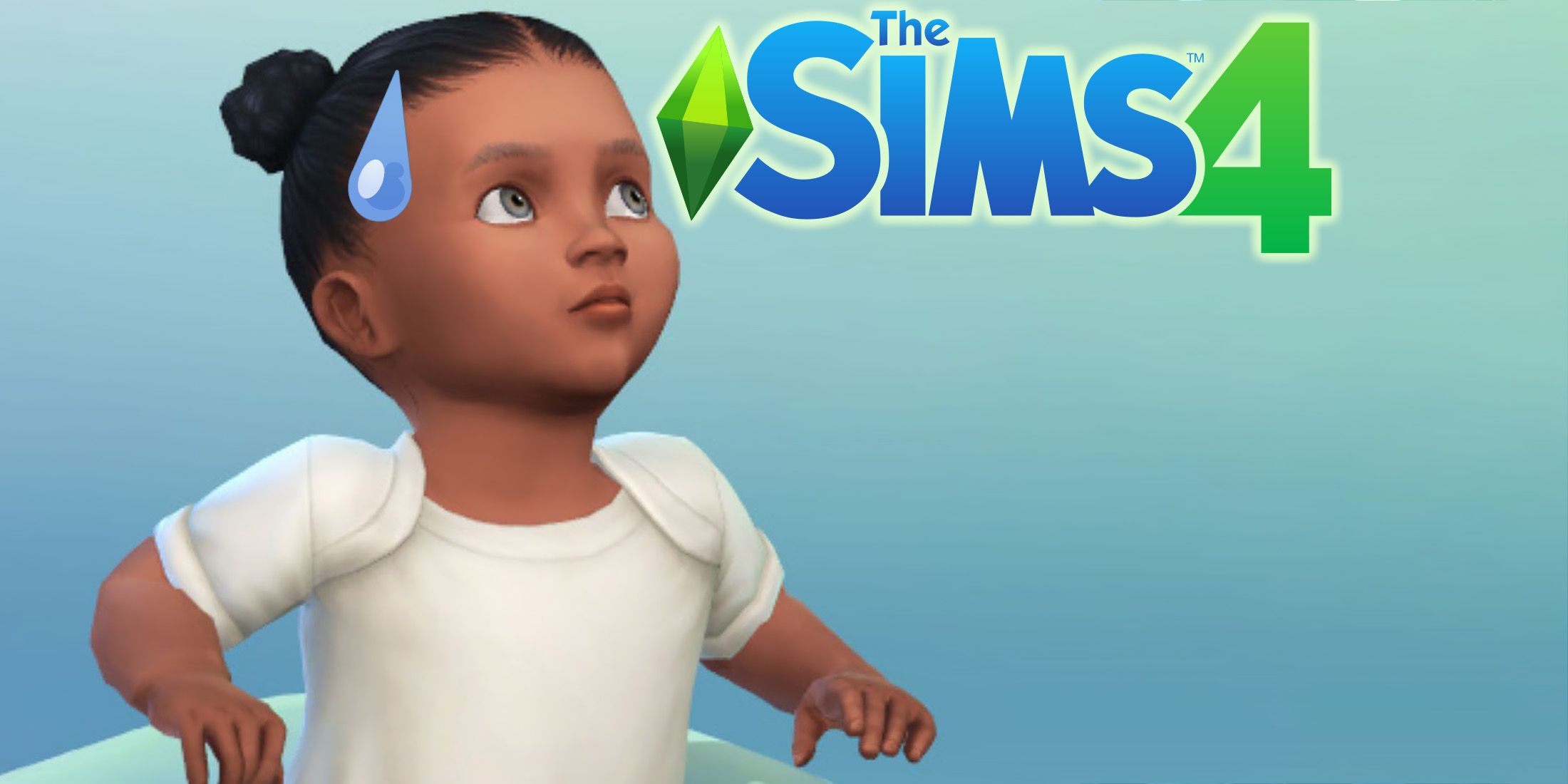
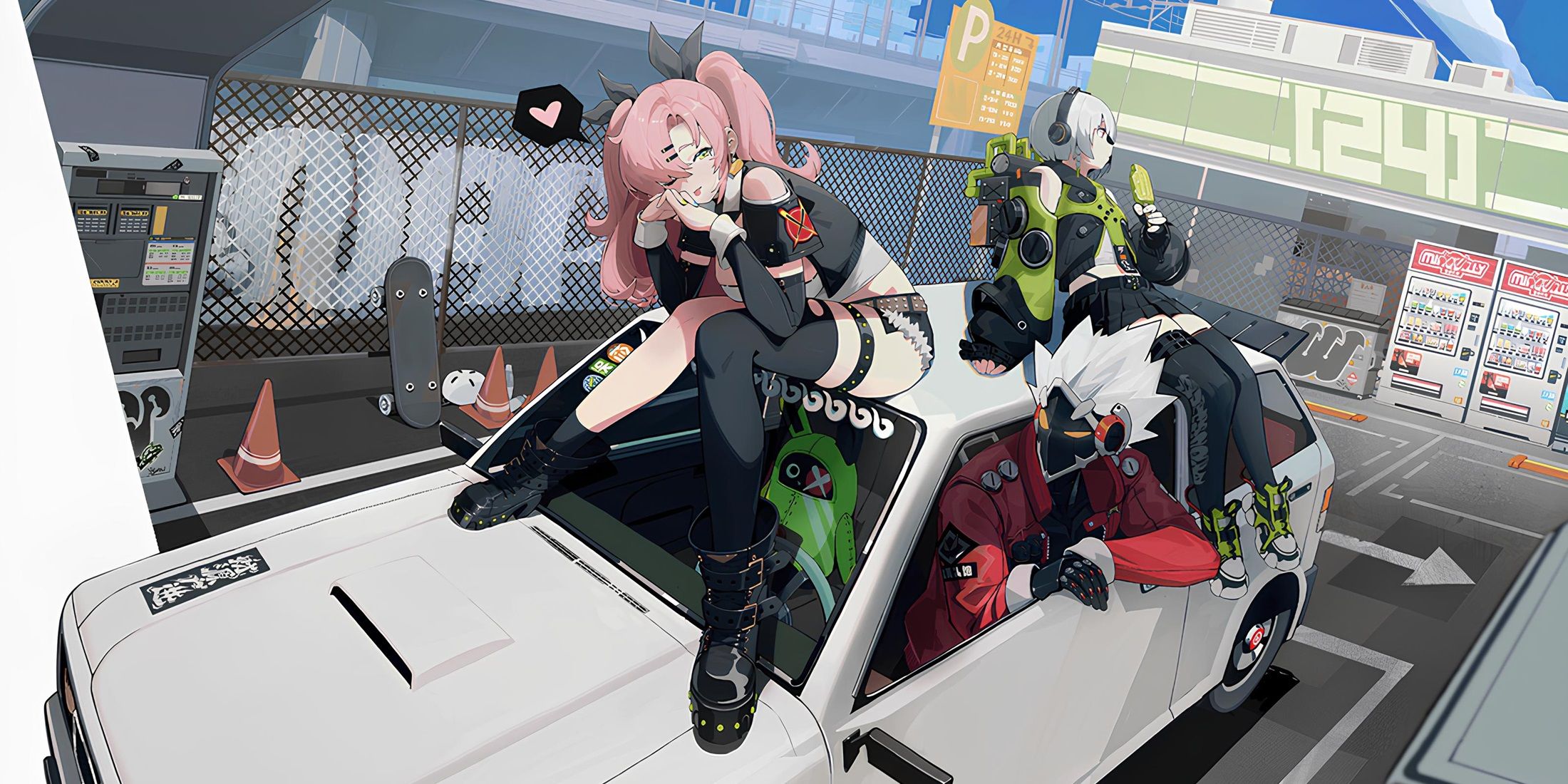
.jpg)
